Federal Oral Court No. 2 is to deliver verdicts for Cristina Fernández Kirchner and several other key former officials from her 2007-2015 governments in a trial investigating alleged corruption in the awarding of public works projects, the case known as ‘Causa Vialidad.’
The court’s decisions arrive six years and eight months after a complaint was filed by Javier Iguacel, the former head of the Vialidad Nacional government roads agency during the Mauricio Macri administration (2015-2019).
Thirteen defendants, more than a hundred hearings and witnesses and 12 judges who intervened in the process from the first instance to the Supreme Court – just some of the numbers that paint one of the most remarkable judicial processes in contemporary political history. Nothing less than the first oral and public trial against Argentina’s vice-president, the leader of the ruling coalition, Cristina Fernández de Kirchner.
The verdict, announced Tuesday afternoon by Judges Jorge Gorini, Rodrigo Giménez Uriburu and Andrés Basso, arrived after Prosecutors Diego Luciani and Sergio Mola asked for the court to sentence the former president to 12 years in prison and perpetual disqualification from holding public office.
2016: The complaint
On April 29, 2016, the government led by Mauricio Macri had only been in power for a few months. Javier Iguacel had been appointed Vialidad Nacional head and was about to experience perhaps his most important day in office: he was going to denounce the former president.
Iguacel denounced the existence of alleged irregularities in the awarding of public works projects in Santa Cruz Province. He said officials had favoured Lázaro Báez’s companies over other firms, been involved in the overpricing and redirection of millions of dollars, that there had been delays in the works and suspicious advance payments.
The main support for the complaint was a report that described the alleged irregularities. It also concluded that as defence lawyers had recalled during the trial: "No relevant construction deficiencies are evident (...)" and that "the mismatches in the certification of works observed are not considered relevant in relation to the magnitude of the works."
Indictment
The complaint was in the hands of Federal Judge Julián Ercolini, who gave it renewed momentum. On September 12, 2016, he summoned the accused – including Fernández de Kirchner, former government officials Julio De Vido and José López and businessman Báez – for questioning.
He gave the alleged criminal scheme four pillars: "The insertion of the presidential friend in public road works"; "the export of a provincial structure set up with trusted people to a national level"; "the greatest concentration of public works in Santa Cruz"; and the "direction of the awarding of works and exclusive benefits to Lázaro Báez to the detriment of the State's coffers."
Argentina’s then-former president was summoned for questioning on October 20, but a week earlier she submitted a brief to the judge requesting that proceedings be declared null and void. The attempt was unsuccessful and on October 31, 2016, she appeared at the Comodoro Py federal courthouse.
Prosecution
Indictments were handed down December 27, 2016. The judge accused Fernández de Kirchner, De Vido, López, Báez and several other defendants who have already gone to trial – such as Raúl Daruich and Mauricio Collareda, the former heads of District 23 of the Vialidad Nacional agency; and Héctor Garro, Raúl Pavesi and Carlos Villafañe, the former heads of the Administración General de Vialidad Provincial (AGVP) body.
Chamber I of the Federal Chamber of Buenos Aires, then composed of judges Jorge Ballestero and Leopoldo Bruglia, confirmed Ercolini’s ruling on 14 September 14, 2017. On November 2 of the same year, Gustavo Hornos and Mariano Borinsky of the Cassation Court ratified it.
2018: Elevation to trial
On March 2, 2018, Ercolini ruled that the investigation was over and that the case should be sent to trial. Referring to the accused, he considered that Fernández de Kirchner "would have harmed the interests entrusted to her by violating her duty to faithfully administer and care for the assets of the national state that were under her responsibility."
In the case of Báez, the magistrate attributed to him having participated in the assembly "of the corporate structure necessary to bring together in it the funds of the national state that were allocated to public road works during the aforementioned period."
2019: Oral proceedings
On May 21, 2019, Fernández de Kirchner – then a senator for Unidad Ciudadana in Buenos Aires Province – arrived at the AMIA courtroom of the Comodoro Py federal courthouse to witness the start of the trial. She was accompanied by her lawyer Carlos Beraldi.
Throughout the trial, Cristina testified three times: on December 2, 2019, she was questioned; on September 23, 2022, she spoke in her own defence at the end of pleadings; On November 29, 2022, she delivered her final remarks before a verdict was reached.
In her initial statement to the court, the former president complained that the judges had rejected her request to broadcast the hearing. Branding it “a lawfare court” and claiming she is a victim of political and judicial persecution, Fernández de Kirchner used a three-and-a-half hour address to reject the allegations against her and deny her late husband Néstor Kirchner had assumed office to commit crimes. “He came in by chance,” she told the court, visibly frustrated.
Witness statements were to follow, with opposition deputies who had filed complaints about the alleged corruption taking the floor.
Some time later – the Covid-19 pandemic complicated proceedings – it was the turn of construction businessmen who had turned state witness and whistleblower in the ‘Cuadernos’ case also probing state corruption.
The rounds of testimonies continued with technical staff and Vialidad Nacional employees, but they stepped up a notch when a number of Kirchnerite officials and allies began to give testimony. President Alberto Fernández, a former Cabinet chief during the Kirchnerite administrations, and Economy Minister Sergio Massa were among them. Chaco Province Governor Jorge Capitanich and Security Minister Aníbal Fernández also gave evidence.
The complainant himself was summoned on March 15, 2022. Addressing the Court, Iguacel ratified the allegations and assured that Báez’s firm Austral Construcciones and “the companies of the group were involved in obtaining contracts, collecting huge advances, certifying work and then doing a little bit of work to cover up the evidence that nothing had been done."
A setback for Cristina
At the beginning of 2022, Fernández de Kirchner received a blow when a number of Supreme Court rulings related to the case were issued. Appeals for the trial to be declared null and void due to jurisdiction (courts in Santa Cruz Province had investigated the works awarded to Báez) and the questioning of an expert report on the awarding of the public works projects (it addressed only 5 of the 51 works awarded to Báez) were rejected with votes in favour from justices Horacio Rosatti, Carlos Rosenkrantz, Juan Carlos Maqueda and Ricardo Lorenzetti.
2022: Pleadings
With that, the way for the beginning of the pleadings was cleared. On July 11, the penultimate stage of the trial got underway with a request for the acquittal of Fernández de Kirchner delivered by the lawyers from the Financial Information Unit (UIF) anti-money-laundering body. They said the alleged fraud and the existence of an illicit association had not been proven.
In mid-2022 it was the turn of the prosecution. Nine days of marathon hearings followed, in which prosecutors Mola and Luciani denounced the "fiction of competition between companies so that Báez could keep the works" – a reference to the cartelisation of public works – and alleged the existence of a secret and illegal plan to commit crimes.
On August 22, sentencing requests were delivered: 12 years for Fernández de Kirchner and 12 for Báez; 10 for De Vido and 10 for Lópéz. The lowest sentences requested were for Garro (former president of AGVP) and Carlos Kirchner (former Planning official) with three years suspended for the former and two for fraudulent administration for the latter.
Liverpool football club
On August 8, 2022, through her lawyer, Argentina’s vice-president filed a recusal motion against Judge Giménez Uriburu and Prosecutor Luciani.
Reacting to the publication of a newspaper article in Página/12 the measure said that both played for an amateur football team called Liverpool that had participated in matches at former president Mauricio Macri's Los Abrojos country residence.
But that was not all: a few days later, Fernández de Kirchner challenged Judge Gorini’s objectivity after it became known that he had held two meetings with opposition leader Patricia Bullrich when she was security minister in the 2015-2019 Macri administration. The defence tried to remove the officials involved, but their demands were unsuccessful.
Defence on front foot
The vice-president’s defence hearings began on September 19 with Beraldi and lawyer Ary Llernovoy, who both questioned the Vialidad report on the public works projects that prompted the complaint.
Beraldi argued that Cristina had been tried twice for the same act (in relation to the case being heard initially in Santa Cruz), rejected the theory that the discretionary allocation of works to the southern province had taken place, dismissed the alleged lack of control over the process due to congressional approval of the works via annual budgets and said that Fernández de Kirchner and Baez had never met in-person.
On September 23, meanwhile, the vice-president said that the accusation had been demolished by facts, saying her team had proven that an alleged meeting she had with Báez had never taken place (she was not in the same province as the businessman at the time the prosecution accused she was), and declared that a democratically elected government cannot be considered an illicit association.
In the case of Báez, his defence was led by Juan Villanueva. Starting October 3, the lawyer criticised expert reports that had “forced results” to “prejudice the defendants.” The prosecutors had "invented a biased hypothesis," said Villanueva, who denied that his client had gone from being a sole contractor to the largest public works contractor as the Kirchners came to power.
"He started as a cashier in 1974 ... and by 1991 he was the general manager of the Bank of Santa Cruz,” said the defence lawyer. “After 26 years of banking career he was appointed director of a construction company. Later, despite the prosecutor's regret, Lázaro presented the cheapest offers and became the first private employer in Santa Cruz.”
Closing remarks
Given an opportunity to reply to the rebuttal from defence lawyers, the prosecutors chose not to respond. "The plea stands on its own. The Court already knows the facts and the evidence that was legally incorporated into this process," declared Luciani.
Closing remarks to the court began on November 25. The first to speak was Báez: he said that his lawyer "has been very clear throughout the whole process" and that, thanks to this, "the truth and reality was exposed."
De Vido, meanwhile, said that "this is the third time that media and marketing reports have been used to accuse me" of wrongdoing. He affirmed: "There was no redirectioning of public works. Each and every one of the works were defined and planned within the framework of the federal planning council, made up of each and every one of the provinces, covering the country's asymmetries.”
On November 29, Fernández de Kirchner spoke before the court for the final time. She described the court as a “firing squad” and announced the publication of a note exposing 20 lies about the case. Among other things, she denied the alleged arbitrary allocation of funds for public works in Santa Cruz and indicated that unfinished works had been "deliberately abandoned during the government of Mauricio Macri, which generated real damage to the State."







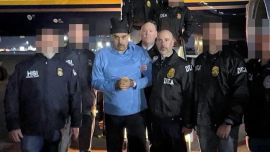







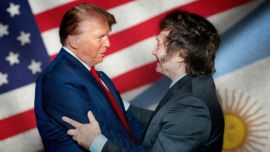
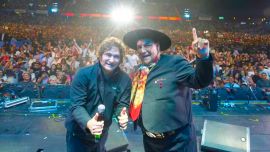
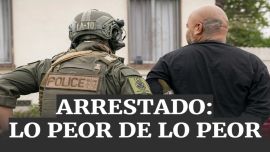
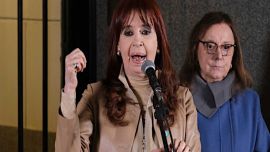
Comments